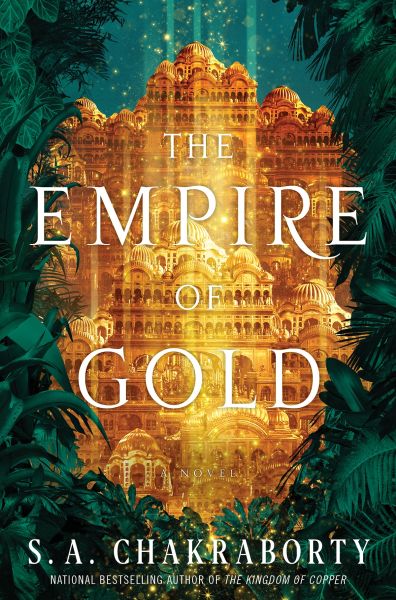Meet The New Boss
The Empire of Gold (Daevabad, volume 3)
By S A Chakraborty

9 Jan, 2024
2020’s The Empire of Gold is the third volume of S. A. Chakraborty’s historical fantasy Daevabad Trilogy1.
Tyrant Ghassan is dead! Banu Manizheh e‑Nahid now rules the Djinn city of Daevabad. The people of Daevabad are about to learn that as bad as Ghassan was, matters could always be much worse.
Manizheh has Daevabad’s best interests in mind, but she has narrow views of what constitutes the greater good. First on the agenda is to ensure that her new subjects support her regime without question or hesitation. For some, like warrior Dara, the solution is magical compulsion. For others, particularly those belonging to tribes Manizheh hates and fears, the answer is mass murder.
A new head of state whose agents are rapidly culling the city’s population is bad enough, but in keeping with past practices in Daevabad. However, during the coup, mistakes were made. Most significant for Manizheh and her subjects, Suleiman’s ring is no longer in the city. Without the ring in its proper place, almost all magic (within a city almost entirely dependent on magic) has ceased to function.
The ring is currently embedded in Alizayd’s heart. Alizayd and series protagonist Nahri were last seen leaping from castle walls into the lake waters below. Manizheh can only hope the pair perished. Unfortunately for the ruler, neither Alizayd nor Nahri are dead. Instead, they were transported through magical means half a world away.
Distance from homicidal Manizheh is about the only asset the pair have. Alizayd and Nahri’s magic has also vanished. The world has changed greatly in the years since Nahri last walked the streets of Cairo. It’s fortunate for the pair that Nahri is particularly adept at landing on her feet.
The smart decision would be to leave Daevabad to Daevabad and seek out a life free from court politics and palace coups. This would entail abandoning people Nahri cares about. Unable to accept freedom at this price, Nahri resolves to return to the city, to liberate it and save those who still live.
In order to return, Nahri and Alizayd will have to make uncomfortable bargains. When they do reach their destination, they will face enemies armed with a weapon Nahri never foresaw: her true name.
~oOo~
This novel features the most sympathetic take on Sobek I’ve seen in a modern fantasy.
There are a lot of SFF stories in which our heroes overthrow the evil tyrant without doing squat about the system of which the tyrant was merely one prominent element. This is not one of those stories. Empire of Gold makes it clear that killing the evil ruler isn’t the magical cure-all for tyranny, as the book begins with the death of one tyrant and the revelation that his replacement is even worse.
On the plus side, the political regime that takes power at the end of this book doesn’t want to murder thousands of people, even though exterminating everyone would end all problems. There are even some attempts at making amends for past transgressions. However, at the end of this book no significant political reform has taken place and the Djinn cultures are still what they are2. Daevabad’s people should enjoy their moment of peace, because it is certain that it will only last a century or two. Bad news for Daevabad but good news for the author should she want to write sequels.
Empire of Gold is aimed at fans of massive tomes focused on high-stakes castle opera. I am not one of those fans3. But I must admit that this series stands out because, unlike many other castle-opera sagas, the series acknowledges the masses of insignificant people (like Nahri herself, back when she lived on Cairo’s streets) who get crushed underfoot as factions vie for power.
Readers for whom the political elements are a distraction can nonetheless enjoy the adventures of the characters, many of whom are appealing and few of whom are cautious. Most of them engage in exuberant pursuit of honour and personal goals regardless of the likely cost. Nahri, perhaps thanks to her past life on the street, is an outlier in being both canny and cautious. The swashbuckling characters may not enjoy long lifespans, but they will give the reader a diverting experience.
The Empire of Gold is available here (Amazon US), here (Amazon Canada), here (Amazon UK), here (Apple Books), here (Barnes & Noble), and here (Chapters-Indigo).
1: Volume One, The City of Brass, was reviewed here. Volume Two, The Kingdom of Copper, was reviewed here.
2: It’s a plot point that despite having great magical powers, Djinn are not creative. They have copied most of their culture from the humans they despise. This leads to antiquated models for marriage, government, and justice. Perhaps someday they’ll encounter new models too enticing to resist. One hopes they wouldn’t be Stalinism or Juche.
3: So not a fan of castle-opera, which is why it took me so long to finish the series.
